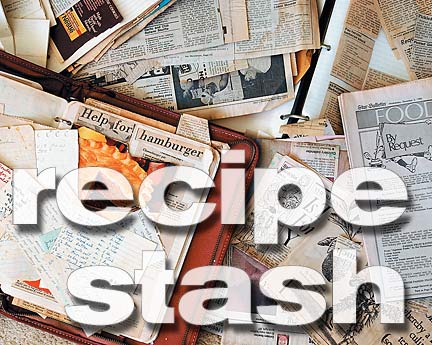
Seasoned collectors find
they're hopelessly devoted
to hoarding recipes
.
Stamps, purses, Elvis memorabilia -- we collect things for all kinds of reasons, but mostly because we can't help ourselves.
In search of
|
But no hermetically sealed collectors' cases for Ah Mai. Nope, everything ended up in two cardboard boxes in her closet. When the closet got too crowded, the boxes moved to the patio. Open a weather-beaten, water-spotted box now, and a gecko is likely to jump out.
What she's got in there is a treasure trove of old paper -- mostly clippings from Honolulu's two daily newspapers, but lots of other stuff, too, including recipes from Julia Child's cooking show, "The French Chef," that Ah Mai sent away for in the 1960s.
It fell to her granddaughter, Kawehi Onekea, to do something with it all, and so was born "Granny's Recipe Collection," a benefit cookbook produced for Onekea's college business class. More on that later.
Right now, the topic is recipe collecting. We're looking for a few hopelessly devoted collectors of cookbooks and/or recipe clippings (see the rules of the game).
We're hoping to uncover some old recipe gems -- but we also want to probe the psyche of those who save.
Butch Pekelo, for example, has been stashing away recipes since the '80s and says it's a form of relaxation.
His haphazard collection includes comic strips about eating, a guide to split-roasting a pig, a photograph of giant pumpkins. He has the label from a can of birds' nests with the instructions for making soup.
Unlike Ah Mai, however, Pekelo has put some time into organizing his bits of paper. They're compiled in a beat-up three-ring binder, with an index keyed to page numbers hand-written on the pages.
In recent years, though, Pekelo has turned his attention to the Internet and is saving new recipes on his home computer.
Both of today's collectors are shy of the spotlight. Pekelo wouldn't let himself be photographed; Ah Mai would only answer questions through her granddaughter, Onekea, and reluctantly, at that.
Where do you get most of your recipes? "From the newspapers, but I collect recipes from cookbooks and the Hawaiian Electric cooking classes."

Kawehi Onekea compiled her grandmotherŐs collection of recipe clippings -- taken from weather-beaten cardboard boxes -- into a cookbook as a project for a business class. Some of the clippings were gathered into folders, but most were stored loose in the boxes.
What is your oldest recipe? "Look in the box."
Now, to enter our collector's contest, you don't have to actually prepare the recipes you collect. Dedicated savers are not always dedicated cooks. Ah Mai, for example, says she only cooked the dishes that looked easy and when she had all the ingredients on hand.
Pekelo says he saves recipes mainly to compare techniques. He has four recipes for Puerto Rican pasteles, for example, because he's on a quest to find one that matches what his neighbor made when he was growing up on Ahua Road, near the airport, during World War II.
"Mrs. Lopez would make pasteles and 'til today I haven't been able to duplicate the taste she had."
His cooking tends toward pork hash (2 pounds will last several days) or curry stew.
Most of the recipes in his collection, "I look at it, ah, I'm too lazy to make it, or it's too much humbug."
Granny’s recipe
collection earns an ‘A’
![]()

Two plus two equals a cookbook.
Working in threes and investing a dollar apiece in their enterprise, each group of students had a semester to develop a product and make as much money off of it as possible.
Onekea and her partners, Maria Duque-Sanchidrian and Rajan Rai, decided on a cookbook based on Ah Mai's hoard of clippings: "Granny's Recipe Collection: A book of Favorites from the Honolulu Advertiser and the Honolulu Star-Bulletin."
They organized and typed up 120 recipes, compiled into an attractive but simple book, then collected a $1 each from "investors" (mostly friends and family) so they could afford printing. They did all the assembly themselves and managed to sell 70 copies at $10 each, earning $3 profit on each one.
Their efforts got them an "A" for the class.
But it's not over.
All their profits are going to Youth Outreach Project, which aids homeless teens in Waikiki. As such, they're up for selling more books, even though the semester's over and Onekea's first baby is due next month.
To order, send checks made out to Kawehi Onekea, at 1188 Bishop St., No. 3402, Honolulu 96813. Cost is $13, including postage.
Onekea says delivery will take six to eight weeks, given the little distraction of the baby on the way.
As an example of the oldies but goodies in the cookbook, here's a recipe first published in the Star-Bulletin in 1970:
Shredded Mango
9 whole green mangoes, peeled1-1/2 teaspoons sea salt
» Syrup:
1 cup firmly packed brown sugar
2 tablespoons water
1 teaspoon red food coloring
1/2 teaspoon Chinese 5-spice powder
Combine syrup ingredients and bring to a boil over high heat. Add mango and cook over medium heat 5 to 8 minutes, stirring occasionally. Cool.
Preheat oven to 170 to 200 degrees.
Arrange mango strips on paper towels in a flat baking pan. Dry in oven 1 hour. Makes 1-1/2 to 2 cups.
[News] [Business] [Features] [Sports] [Editorial] [Do It Electric!]
[Classified Ads] [Search] [Subscribe] [Info] [Letter to Editor]
[Feedback]
